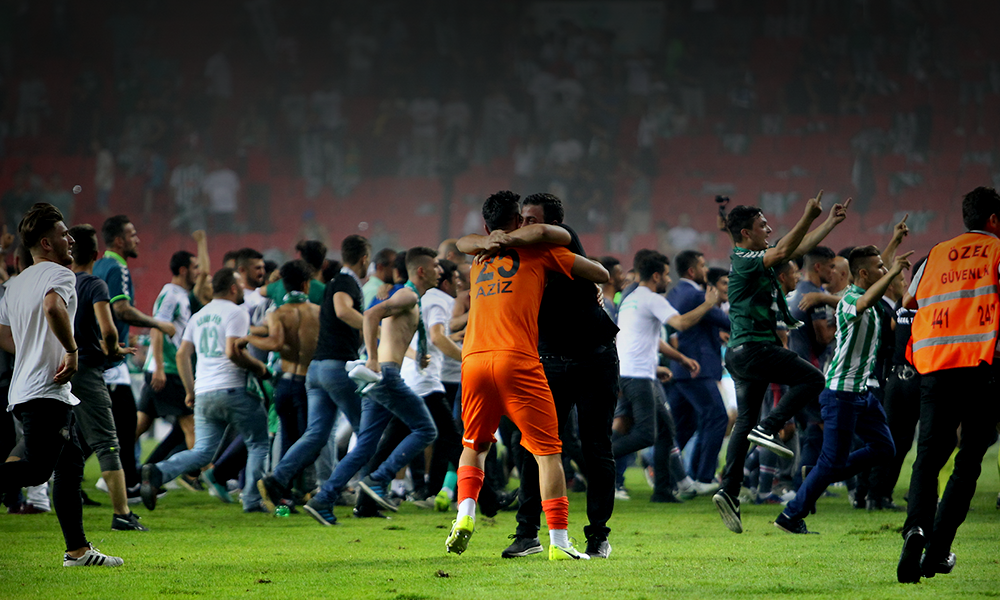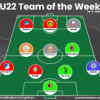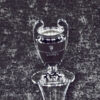Oliver McManus takes us on a journey through some of the more obscure parts of Europe as he tells us about some of the Hipster teams to watch out for in the Europa League.
Yes here we are, back for a second year, with the 2017-18 UEFA Europa League Hipster Guides; for you newbies around here this a 2-part 10-team “Hipster Guide” on teams battling out in this incarnation of the Europa League but you won’t see the likes of Arsenal in this article, oh no, we’re talking Czech Cup Champions, Belgian Cup winners and many, many more. If that wasn’t enough, we won’t be revisiting any of the 10 teams that featured last season (why would we?), so I’m certainly making things hard for myself.
Without letting the do get in any way furthered, here we go.
FC Fastav Zlin / Czech Republic
Kicking things off with a bumper profile of those pesky Czech Cup Champions, try saying that 3 times in a row, where we stumble across a club with a very rich history; a history that can be traced all the way back to their foundation in 1919, right after the conclusion of the First World War.
Between the years of 1938 and 1947 they played in the top flight of Czech football (despite the small matter of the Second World War) but met their demise in an unceremonious fashion, being disqualified from the league for “manipulation of results” or, put simply, match-fixing. Until 1993 they would spend just 4 further seasons in the top division and since then they’ve had a mixture of stability and turmoil within the club.
Last season saw them end their 46 year spell without silverware as they added to their barren trophy cabinet, which previously held just the single 1969-70 Czechoslovak Cup, the Czech Cup and, additionally, the Czechoslovak Super Cup (played between the winners of the Czech and Slovak Cup competitions). The latter trophy earned them their slot in the Europa League and patched over the blemishes of a mere 6th place in the league but they secured the cup in some style.
“Attack, attack, attack” was conceivably their mantra throughout the tournament with the team, coached by Bohumil Panik, seemingly taking out their frustration with the perceived indignity of having to play 4th division opposition in the opening round with a 4-0 demolition of Trebic, before continuing to find the back of the net with an alarming consistency as they progressed through the rounds. 11 goals in the next 3 would see them reach the semi-finals with relative ease where their attacking spirit would be slightly diminished but, still, successive 1-0 wins saw them clinch the trophy for the first time in their history and, indeed, European football for this season.
European football history for the club is brief in the sense that they have none whatsoever, not at least for the Champions League or Europa League (including its various other names), but they did appear twice in the ill-fated Intertoto Cup in the 2004 and 2005 editions. They didn’t really achieve too much though, a 4-3 win against Finnish minnows MyPa, 3-0 against Belgian club Westerlo and a 1-0 triumph against Belarusian nomads Neman Grodno was all they had to show for their 2 tournaments.
Key to their chances of any progression will be Moses Ubong Ekpai and Dame Diop, two Africans at the heart of the Czech team, Ekpai the creative midfielder who spent time on loan in the Czech First League last year with Liberec and Diop, a Senegalese striker who struck 17 goals from 55 appearances for FC Shirak and 6 in 15 for Fastav last season.
History is guaranteed to be made for the club throughout the tournament, the question is how much history can they make – First point? First win? First away win?
Konyaspor / Turkey
There you go then that’s the bumper prolife done so let’s get to the hard graft of the next nine times, with Konyaspor from Turkey being our next stop. Nicknamed the Anatolian Eagle, last season they finished 9th but it was hard to decide if that was a better campaign than the one previous whereby they finished 3rd in the league.
As confusion cascades across your face let me at least attempt to justify why I’ve made that statement – yes they finished 23 points and 6 places worse off than 2015-16 but they also had to juggle the pressures of their first ever European conquest and, indeed, scored more or less the same amount of league goals as the season before. On paper then it was a worse season but then you add in their Turkish Cup triumph in which they overcame stiff opposition from Kasimpasa and Istanbul Basaksehir to take the trophy and, with it, their Europa League group stage position and you have an, at least, on par with 2015-16.
The club are coached by Mustafa Resit Akcay, a 58 year old Turkish national, who has spent the last 16 years bouncing around the Turkish domestic leagues with 13 different clubs. Appointed in June of this year, Ackay’s last job was with Osmanlispor where he took charge for 84 matches garnering 129 points along the way.
Typically known to favour the 4-3-2-1 formation the club may see a change to their tactics this season given that they’ve managed to secure a whole raft of attacking talent in the duration of the transfer window – Riad Bajic left the club for EUR5.5million for Serie A club Udinese in August but they’ve got Abdou Razack Traore, Moryke Fofana and Imoh Ezekiel to fill that void.
Most exciting of all those young talents is Imoh Ezekiel whose main position is centre-forward but can also play on the right-wing and having left Standard Liege in 2014 to chase Qatari money, he’s decided to return to Europe to set his career back on track. Still at the tender age of 23 the Nigeria international possesses a vicious right foot and a deadly turn of pace that will make sure he goes, at least, some way to matching Bajic’s 17 goal haul from last season.
In terms of European football, they made their debut in UEFA competitions last season as they partook in Group H of the 2016/17 UEFA Europa League in a group containing Shakhtar Donetsk, Braga and Gent whereby they pretty much just tanked, to be honest. A 1-1 draw with Braga being the best return probably tells you all you need to know about how bleakly they performed but, to be fair, I’m not entirely sure they actually gave it their all.
Oddly I do rate their chances this year though as their attacking strength just seems, not unstoppable, but really exciting to watch and rather less exciting to play against; Red Bull Salzburg, Marseille and Vitoria de Guimaraes will serve as their opposition and they’ll certainly be looking to progress from that group.
Zulte Waregem / Belgium
Formed a mere 16 years ago and about to embark on the 4th European campaign, life can’t get better for the Essevee. Formed from the ashes of Zultse VW and KSV Waregem, Zulte Waregem are the birth child of both relative amateurs (Zultse) and top-flight regulars (KSV).
They are also the third successive team in this guide to have made it through to the Group Stages via winning the domestic cup competition despite the fact that they only finished in 6th place in the league (after play-offs) and the team above them, Charleroi, will be playing no Europa League football this year. To make things that little bit weirder, the team who finished in 8th during the regular season will also be competing in this competition. I told you it was weird.
My thoughts on the qualification criteria aside let’s see how Waregem paved the way for their first European season in 3 seasons. It all started on the weekend of the 20th/21st September 2016 as they entered the Belgian Cup in the 6th Round (of 10) and faced Cappellen, from the 4th division. Igor Vetokele grabbed the first goal to put them one up and although Stef Van den Heuvel levelled things up with 15 minutes to play, Mbaye Leye nabbed the winner in the 89th minute of play in a performance that was described as “calm mastery”.
Through to the 7th round they would face 3rd tier ASV Geel, away from home, and would be taken to extra time having needed a penalty in the 36th minute to get them even that far. Nonetheless they eked out the win in a display less “calm mastery” and more “panicky shoddiness”. The next couple of matches were far more comfortable and set up a cracking clash between the club and Oostende which was absolutely end to end, slugfest football. 19th minute, 1-0 Oostende. 25th minute, 1-1. 54th minute, 2-1 Oostende. 64th minute, 2-2. Extra time looms. 110th minute, fatigue setting in for both sides. 111th minute, 3-2 Zulte Waregem. 116th minute, THREE ALL! Good lord, I watched that match live and it was a roller coaster so when we hit penalties I had no energy left to be honest but thankfully, 100% accuracy from Zulte saw them lift the trophy thanks to a 4-2 penalty win.
Stability is at the core of the club’s ethos and that begins with their manager Francky Dury who came to the helm in 2012 following a stint with the Belgium Under-21 team. It’s not the first time he’s taken charge of Zulte, however, having been here from 2001 and 2010, as well manager of predecessor club Zultse VE for a total of 10 years. What we’re essentially looking at is 24 years of experience at this one club.
With 6 years still left on his contract, Dury favours a defensive 4-3-3 formation with a key backline of Timothy Derijck, Marvin Baudry and Davy de fauw all being joined by new young prodigies such as Ben Reichert and Sandy Walsh. It’s fair to say that this club doesn’t play by many rules (off the pitch, I mean, they’re fully law abiding on it) and are determined to do things their own way.
Pre-season has been a bit iffy to say the least with no less than 15 different players either being sold or returning to their parent club after a loan spell, leaving the club missing out on many key players. Thankfully, recruitment has been steady with 7 really, genuinely, bright prospects joining the club on loan; Nicola Leali joins from Juventus having spent last season with Olympiacos and comes with a burgeoning reputation that can help the club fill the troublesome goalkeeper position that’s plagued them in previous seasons. 19-year-old Aaron Leya Iseka signs from Anderlecht, the brother of Michy Batshuayi, looking to carve out a name for himself.
Drawn in a really tough group, in my opinion the most competitive group of the competition, Zulte Waregem will need to bypass Lazio, Nice and Vitesse if they’re to move onto the knockout stages so they’ll have to build on their impressive start to their domestic campaign in order to do so.
Ostersunds FK / Sweden
Ostersunds FK have given me a massive headache because I started to write this guide after the first leg of the play-offs had been played. I looked at the fixtures and results, saw that PAOK had beaten some obscure Swedish club 3-1 and foolishly assumed that the fixture was a done-deal. So I wrote about 500-600 words on PAOK and what we can expect from them only to find THAT Swedish club went through on away goals having won the 2nd leg 2-0.
As you can probably tell the club I’m talking about is, obviously, Ostersunds (known more locally as OFK) who were founded a mere 21 years ago as a merger between Ope IF, IFK Ostersund and Ostersund/Torvalla FF in a bid to create just the one club in the city which could, potentially, go on to be competitive in the highest reaches of Swedish football. 1 year later, in 1997, Froso IF decided that they too wanted a slice of that pie and as a result the ambition was one step closer to being a reality.
Starting life off in the 3rd tier of Swedish football (known oddly as Division 2) was always going to put their project on the back-burner for a while because firstly they actually needed to reach the Allsvenskan. Despite actually finishing 2nd on 3 occasions and, indeed, 1st back in 1999 they failed to secure promotion because of some weird format which mandated a play-off system in order to secure promotion.
Having briefly been relegated to the 4th division for the 2011 season, the squad quickly bounced back and haven’t looked back since; securing automatic promotion in that season, they carried the momentum on to take the Tier 3 (now Division 1, even weirder) title the following year. 3 seasons in the Superettan would result in a stable core to the team which guided them to promotion in 2015, meaning 2016 would be their first year in the Allsvenskan and their first opportunity to really achieve their founding goal.
With enough confidence in their own ability to stave off relegation, the club decided to focus on the Svenksa Cup – the winner of which earns Europa League qualification – and, given that they’re on this list, this risk paid off as they conquered IFK Norrkoping 4-1 in the final to secure European football for the first time in their short, short history.
At the heart of the team lie two young English players in 23 year old, Curtis Edwards and 25 year old, Jamie Hopcutt. Both had relatively obscure non-league careers back in England with the likes of Spennymoor Town and Tadcaster Albion before Hopcutt made the move in 2012 on an initial three-month contract. Such was his form that by the end of the season it had already been renewed twice and extended for a further two years.
Edwards joined last year and between the two of them they have managed to create a dynamic partnership in the midfield of Ostersunds, capable of bouncing off one another they just seem to intuitively know what the other will do and are able to weave the tapestry almost seamlessly.
Another club that’s making their European debut, they’ve already pulled off superb wins against Galatasaray and PAOK on their way to the group stage so it would be foolish to bet against them doing the same in a group containing Athletic Bilbao, Hertha BSC and Zorya Luhansk.
Rosenborg / Norway
The final club on our glorious tour of those “Hipster” teams for you to keep an eye on and where else would go other than the HOME of Hipster – Scandinavia of course! So here we are with the Norwegian Champions of 2016, Rosenborg!
Sorry, sorry, Norwegian Champions of 2016 AND 2015 and they look fully like they will retain that title for a 3rd successive season which would be the longest run of top-tier titles in Norway since Rosenborg, themselves, won THIRTEEN in a row between 1992 and 2004 – a fun, yet, inconsequential fact.
Last season was about as comfortable as it could ever get for the club because not only were they reasonably impressive in winning 21 games and only losing 3, they also benefited for the incredibly poor form of almost every other club in Norway. It was almost an alignment of the Gods, with Stromsgodset, Stabaek and Molde all failing to live up to the pre-season billing of a potential four-way title tussle.
Backtracking a bit I’d probably say that the word that best sums up last season for Troilongan (The Troll Children – odd, I know) is probably the rather unattractive “efficient” because, at the end of the day, that’s what it was. It wasn’t spectacular, it was just a case of getting the job done and getting it done well.
What started out as an experimental 4-3-3 soon became their settled formation and managed to produce an incredible combination of fast, counter attacking football and a strong and stable back line. Oh god “strong and stable”, who am I, Theresa May?! Speaking of which, has she cracked out any more banging dance moves, or expanded her career to Tube V Sex yet?
Anyway that attacking bank of three consisted of Christian Gytkjaer as the main striker and, usually, Matthias Vilhjalmsson and either Yann-Erik de Lanlay or Elbasan Rashani as the two wingers. Gytkjaer was the league’s top goalscorer with 19 goals, 23 in all competitions whilst Vilhjalnssib, de Lanlay and Rashani chipped in with 16 between them and absolute hatful of assists – creativity agog, Rashani has left the club now by the way but still, a very impressive attacking trio.
Kare Ingebrigtsen, known as Bruttern, has been the man at the helm since 2014 having previously been assistant in 2007, Ingebrigtsen has actually spent most of his career as assistant with a further 2 years at Viking (2012-2014) where he was the understudy to Kjell Jonevret for 67 matches. Managerial wise he took charge of FK Bodo/Glimt for 3 years with the club being relegated from the Tippeligaen in his first year in charge before mediocre performances kept them in the 1.Divisjon for longer than they’d have hoped – not exactly a gleaming CV that he carries with him then.
That distinct “meh” managerial record aside, Ingebrigtsen has really hit his stride with Rosenborg in building a team of both experience and youth – over the winter and summer the club have brought in Nicklas Bendtner, Vegar Hedenstad and Milan Jevtovic (experience) and Jacob Rasmussen, Jonathan Levi and Samuel Adegbenro (youth) to complement the existing squad.
Adegbenro is a riveting Nigerian winger playing on the left, having spent 2 years with Viking, making 75 appearances across 3 seasons scoring 17 goals; Levi’s a 6ft flat central midfielder with an engine-esque work rate that seemingly leaves him never breathless, he’s joined from Osters IF; finally, and I tell you what, whatever you say about Bendtner, I maintain that he’s the best 3rd choice striker in the world.
In European football they’ve found their groove in the Europa League with consistent appearances in its various guises since the turn of the century but, unfortunately for them, they’ve never managed to make an impact on the tournament. Last season they navigated a qualifying round of the UCL, beating Norrkoping before losing to APOEL, then crashing out of the Europa League play-off round to Austria Wien by a margin of 4-2.
This season they’ve already caused a stir by beating Ajax 4-2 in impressive fashion to, firstly, send the fans crazy and, secondly, inadvertently raise the expectations for the Group Stages. They’ll be facing Vardar, Zenit Saint Petersburg and Real Sociedad in a group which, statistically should see them finish 3rd but statistics often mean nothing (which is great for us writers) and the 274,958 people of Trondheim, Norway, will be cheering their boys on all the way.
That’s the end of the first Europa League Hipster Guide, I’m fairly certain we’ve all learnt something, the excitement levels have been set for this illustrious tournament which is, this time around, featuring some of the biggest clubs of all – Arsenal, Everton, Lyon and Milan are all going to battle it out for some major silverware.
Next time we’ll take a look at 5 new teams in Astana, Nice, Braga, Vardar and Ludogorets.
Part Two ->
- Syria: The path to World Cup qualification - July 8, 2020
- The story of South Africa’s topsy-turvy footballing journey - November 8, 2017
- Interview: Sunil Chhetri on his foreign stints, Bengaluru FC, and the rise of Indian football - October 24, 2017
























































